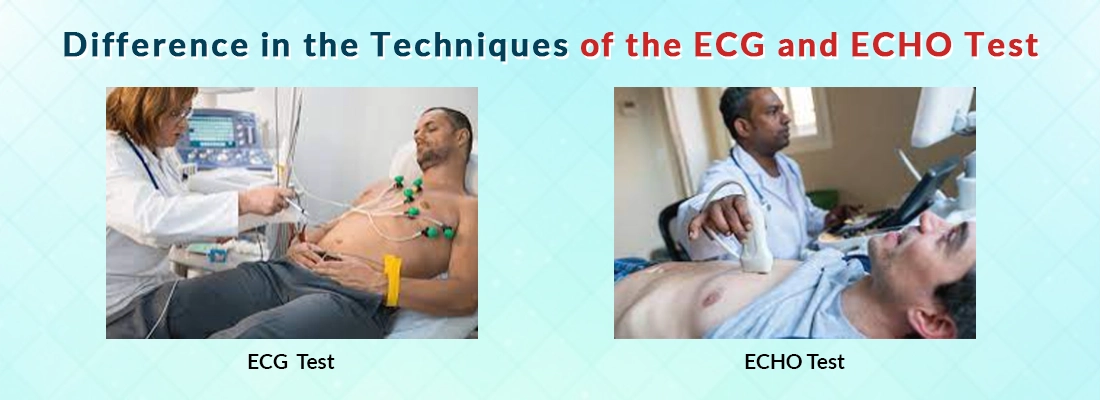
Cardiology tests are the tests that are used for screening and diagnostic purposes for heart conditions. ECG and ECHO tests both are a type of cardiology tests. In this blog we will know about their differences and individual...
Often ECG and EKG tests are confused. Both these tests are names for the same test, an electrocardiogram. ECG is a test that is used to measure the electrical function of a person's heart. It is also known as an electrocardiograph. It is a pain-free and easy procedure.
The electrical impulses produced help to push the blood around the entire body. The electrodes are an essential part of the ECG procedure which are placed on your body to detect the electrical balance.
ECHO Test otherwise known as Echocardiography test uses sound waves to produce pictures of the inside of the heart. ECHO test does not use any radiation. This test produces 2D and 3D images of the inside of one's heart which are used by the doctor to diagnose and evaluate different conditions of the heart. It can be used to visualise the heart, its chambers, direction of blood flow, and cardiac muscles. It can be used to identify the signs and symptoms of a stroke or heart attack.
When Do I Need an ECHO Test and an ECG Test?
ECGs can be used to diagnose
- If you are experiencing irregular heartbeats, i.e. arrhythmias
- If you are having chest pain which is radiating to your shoulder, it can be a sign of heart attack or coronary artery disease.
- If you have had a heart attack before
- It can help access the efficiency of heart for any disease treatments such as to access cardiac pacemaker
- It can help screening you if you have risk factors like family history of heart disease, smoking, alcohol abuse, obesity or above a certain age.
ECHO test can be used for
- Checking the functions of heart and heart valves and its chambers
- Identifying any cardiac diseases or conditions for its source
- It can be used to visualise and diagnose any congenital heart disease.
- It can be used to see defects in the developing foetus
Difference in the Techniques of the ECG and ECHO Test

ECG-Electrocardiography
- ECG is operated while placing electrodes on your body skin, this is a painless procedure
- 10-12 patches of these e;ectrodes are placed. They are placed on the chest, arms and legs. These are then wired to a machine.
- The machine collects the electrical signals and prints them on paper. The paper is then used for further analysis.
- The whole process of ECG takes about 10 minutes.
- The whole ECG procedure is a risk free procedure, even the electricity imposed by the electrical patches are harmless.
- The ECG procedure is sometimes combined with you walking/running on a treadmill. This test is known as the stress test or TMT test.
ECHO-Echocardiography
- An ECHO test is a diagnostic technique that uses sound waves to produce moving pictures of the inside of the heart.
- It usesultra-sound waves to produce images via 2-Dimensional, 3-Dimensional, and doppler imaging. Transthoracic, transoesophageal, and stress ECHOcardiography are other methods to perform ECHO tests.
- For conducting this scan, a transducer is used, which is attached to the monitor. The transducer is run over the body part to be viewed and the images are displayed on the screen.
- The procedure takes about 10-15 minutes to complete.
Differences in ECG and ECHO Test Uses
- An ECG test is used to measure the electrical activity which in turn tells about your heart’s pace, rhythm and regularity Whereas Echocardiography tells about the heart’s size, shape, pumping ability and about the heart’s tissue damage.
- An ECG is a rapid test used for screening procedures in conditions like arrhythmias, heart muscle damage after heart attack and to check the condition of an implanted device such as a pacemaker. Echocardiography is primarily used to assess the state of heart muscles after a heart attack.
- ECG test is used as a part of standard health examination before a major surgery. ECHO test is used for screening infections in heart chambers and valves. A colour doppler ECHOcardiography provides accurate results for heart’s blood flow.
Risks Associated With ECGs and ECHO Tests

- An ECHOcardiography test poses minimal risks of adverse effects and problems
- During a trans-oesophageal electrocardiogram, while the sonogram is moved down the throat, a person can gag during or sore throat after the test.
- Trans-oesophageal technique can cause some rare complications such as - injury to throat, vocal cords or oesophagus.
- Some people can develop allergic reactions to local anaesthesia, sedatives or contrast dyes which might be used for the test
- If you are given anaesthesia/ sedatives you can suffer nasal regurgitation (having stomach contents in lungs). This is why you are indicated to come empty stomach for the test.
Conclusion
ECG and ECHO tests are of great value in terms of diagnosis. The main difference between an ECG and ECHO test is that the ECG shows electrical activity of the heart while the ECHO test shows the physical features and mechanical functioning of the heart. Both the tests are of their own diagnostic importance. In addition, they are easy, non-invasive and relatively inexpensive tests when compared with other imaging techniques.
For Free Consultation From the Doctor
Get connected to our doctor directly-
- Dr. Ravin Sharma MBBS, MD Radiology)
- Phone Number- 9212125996
- Available- 24*7*365
Why Ganesh Diagnostic And Imaging Centre?
Ganesh Diagnostic Centre is an established and renowned diagnostic centre since 2001.
We have many ECHO and ECG tests and scans , which can offer report Images online as well. We also offer FLAT 50% OFF on many Scans.
Their excellence is backed by NABH and NABL Accreditations
NABH accreditation is proof of the highest standard of care and service provided to the patients. NABL accreditation reflects the competency of laboratories and equipment based on some national and international standards.
We are known for providing excellent service and care to its patients for decades having created Lakhs of satisfied patients over the years!
Ganesh Diagnostic and Imaging Centre is a one-stop solution for getting all kinds of diagnostic Scans done, as all services are available under one roof.
GDIC aims to provide the world’s advanced technology at the most reasonable and lowest price.
The rates of ECHO and ECG tests and scans are reasonably priced. Patients can rely upon scan Image reports as reports are 100% accurate
Frequently Asked Questions ECHO and ECG
Is ECG needed if the Echo test came normal?
ECG test may or may not be needed if the ECHO test came normal. The need of an ECG test depends on the doctor's recommendation and conclusion of ECHO Test.
What is the full form of the echo test?
ECHO test is the echocardiogram test. This test uses high frequency sound waves known as ultrasound waves to make pictures of your heart. It is also called an echocardiography test used as a diagnostic imaging test.
What is the full form of the ECG Test?
An ECG test is named as an electrocardiogram. This test records the electrical activity of the heart. The electrical activity of the heart can help your doctor to determine your heart’s heart rate, heart rhythm, pulse rate etc.
Can an ECHO test or an ECG test be done at home?
ECG or ECHO tests are conducted at hospital most commonly but if there is an odd situation where the patient is debilitated and cannot come to the hospital, the tests can be performed at home as well. These tests use heavy apparatuses and more armamentarium which is difficult to carry and set up so it is preferred to do it at the hospital where it is already set up unless an odd situation comes up.
Can ECHO test detect blockage?
The ECho test wichita variant using treadmill known as TMT test, is capable of detecting blockages more efficiently than the normal ECHO test which gives information about the heart chambers and its pumping ability.
How accurate is a Stress ECHO test?
Stress echo tests are quite accurate in showing heart diseases. It is approximately 70% accurate.
What are cardiac tests?
Cardiac tests or cardiology tests are the tests used to determine and diagnose certain heart diseases. Cardiac tests involve
- Blood tests
- ECG- electrocardiography
- Exercise/ stress test (TMT)
- Coronary angiography
- MRI- magnetic resonance imaging
- CCTA- coronary computed tomography angiogram
- Echocardiography etc.
Are Echo tests and ECG tests safe?
Yes the tests are safe and pose non risks, these are non invasive tests that do not use any radiation although people have different criteria for feeling comfortable, the tests can be a little uncomfortable depending on person to person.










